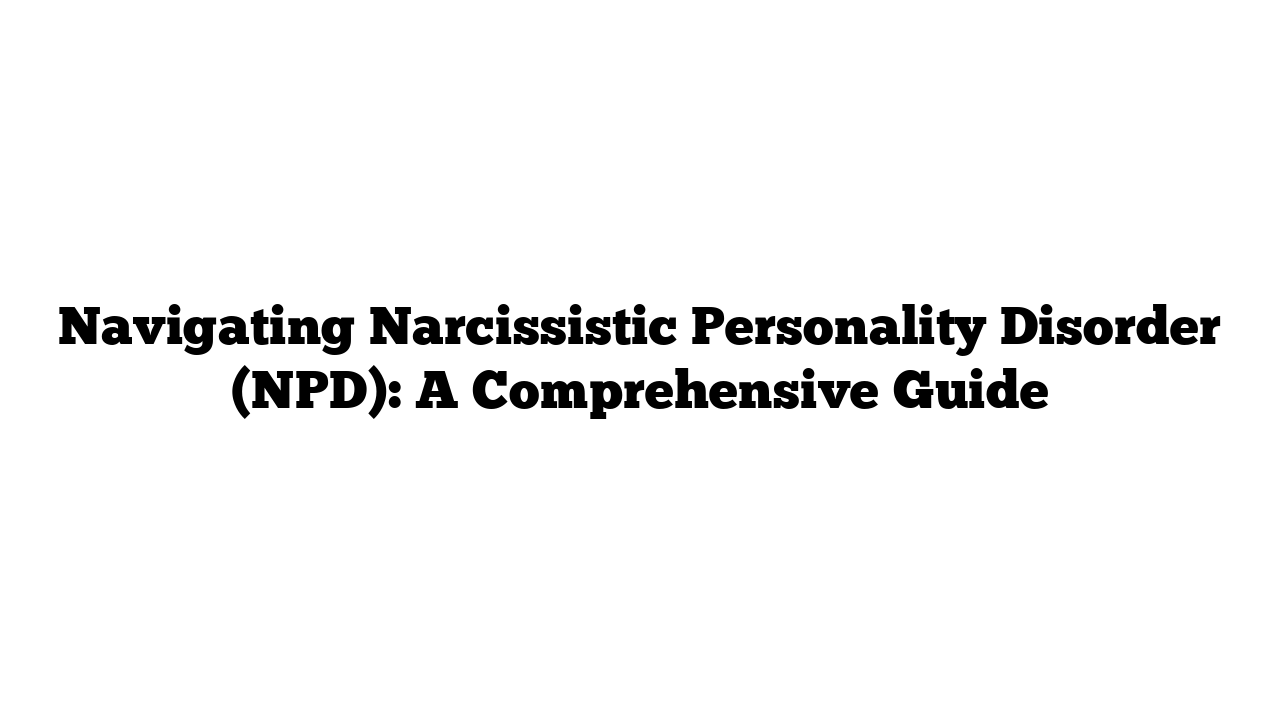Narcissistic Personality Disorder (NPD) is a mental health condition characterized by an excessive sense of self-importance, a deep need for admiration, and a lack of empathy for others. While it may appear as mere arrogance or vanity, NPD is a serious psychological condition that can lead to challenges in relationships, work, and overall well-being. This article will explain NPD, its symptoms, causes, diagnosis, and treatment, providing insights into managing this condition effectively.
What is Narcissistic Personality Disorder (NPD)?
NPD is one of the Cluster B personality disorders listed in the DSM-5 (Diagnostic and Statistical Manual of Mental Disorders). It is marked by a pattern of grandiosity, constant seeking of validation, and difficulty in maintaining healthy relationships.
People with NPD often present as confident or charming on the surface, but underneath, they may struggle with insecurity and vulnerability.
Key Symptoms of NPD
NPD manifests through distinct behaviors and thought patterns. Common symptoms include:
- Exaggerated Self-Importance: Believing they are superior to others or uniquely talented.
- Need for Excessive Admiration: Craving constant praise and validation.
- Lack of Empathy: Difficulty understanding or valuing the feelings of others.
- Sense of Entitlement: Expecting special treatment or compliance with their expectations.
- Interpersonal Exploitation: Using others to achieve personal goals without regard for their well-being.
- Envy: Feeling envious of others or believing others envy them.
- Arrogance: Displaying haughty attitudes and behaviors.
These symptoms can affect various aspects of life, including personal relationships, career, and mental health.
What Causes NPD?
The exact cause of NPD is unclear, but researchers point to a combination of factors:
- Genetics: Family history of personality disorders may increase risk.
- Environment: Over-pampering or excessive criticism during childhood can influence personality development.
- Childhood Trauma: Abuse, neglect, or excessive expectations in childhood can contribute to the condition.
- Cultural Influences: Societies that value achievement and materialism might encourage narcissistic traits.
How is NPD Diagnosed?
Diagnosing NPD requires a thorough evaluation by a licensed mental health professional. The steps include:
- Clinical Interviews: Discussing thoughts, behaviors, and feelings to identify patterns.
- Personality Tests: Using validated tools to assess narcissistic traits.
- DSM-5 Criteria: A diagnosis requires meeting at least five of the nine criteria outlined in the DSM-5.
Living with NPD in the USA
In the USA, societal pressures and competitive environments may contribute to the prominence of narcissistic traits. However, NPD is a diagnosable condition that goes beyond simple arrogance or ambition. Understanding and addressing this disorder is essential to reduce stigma and encourage individuals to seek help.
Impact of NPD on Relationships
NPD can create significant challenges in personal and professional relationships:
- Romantic Relationships: Partners may feel undervalued or manipulated.
- Workplace Dynamics: Colleagues may struggle with the narcissistic individual’s entitlement or lack of cooperation.
- Family Life: Family members often bear the brunt of unrealistic expectations or emotional manipulation.
Treatment Options for NPD
Although treating NPD is complex, it is possible to manage and improve symptoms with the right approach:
- Psychotherapy:
- Cognitive Behavioral Therapy (CBT): Helps patients recognize and change negative thought patterns.
- Schema Therapy: Focuses on identifying unmet needs from childhood and developing healthier behaviors.
- Medication: While no medication directly treats NPD, drugs may be prescribed to manage associated symptoms like anxiety or depression.
- Support Groups: Engaging with others facing similar challenges can foster understanding and growth.
- Building Self-Awareness: Encouraging individuals to reflect on their actions and their impact on others can be transformative.
Debunking Common Misconceptions
- “All narcissists have NPD.”
- Not all narcissistic traits indicate a diagnosable disorder. NPD is a specific condition with distinct criteria.
- “People with NPD cannot change.”
- Change is challenging but possible with commitment and professional help.
- “NPD is just about being confident.”
- Confidence is healthy, but NPD involves deeper psychological struggles, including insecurity and impaired empathy.
How to Support Someone with NPD
Supporting someone with NPD requires patience and boundaries:
- Educate Yourself: Learn about the condition to better understand their behavior.
- Set Limits: Establish clear boundaries to protect your well-being.
- Encourage Therapy: Suggest professional help in a non-confrontational way.
- Avoid Feeding the Ego: Don’t reinforce harmful behaviors by over-praising or enabling manipulative tendencies.
The Importance of Awareness
Narcissistic Personality Disorder is more than just a label. Increased awareness, better mental health education, and access to therapy are crucial in helping individuals with NPD lead healthier, more fulfilling lives.
For more tips and insights, visit medicaltimes.io for trusted explanations and resources.
Top 10 FAQs on NPD
1. What is the primary cause of NPD?
There is no single cause; genetics, environment, and childhood experiences all play a role.
2. Can NPD be cured?
No, but it can be managed with therapy and lifestyle changes.
3. Are all narcissists abusive?
Not necessarily, but individuals with NPD may exhibit manipulative or exploitative behaviors.
4. Is NPD more common in men or women?
NPD is diagnosed more often in men than women.
5. Can children develop NPD?
The traits often emerge in adolescence or early adulthood, but a diagnosis is typically made in adulthood.
6. How can I tell if someone has NPD?
Look for patterns of grandiosity, lack of empathy, and constant need for admiration. A professional diagnosis is essential.
7. Can people with NPD feel love?
Yes, but their relationships may be influenced by their struggle with empathy and vulnerability.
8. Is therapy effective for NPD?
Yes, therapy can help individuals manage their symptoms and improve relationships.
9. What is the difference between NPD and self-confidence?
Self-confidence is healthy, while NPD involves deep-seated insecurity and harmful behaviors.
10. Are people with NPD aware of their condition?
Some may be aware but lack the motivation to seek help. Therapy can improve self-awareness.
